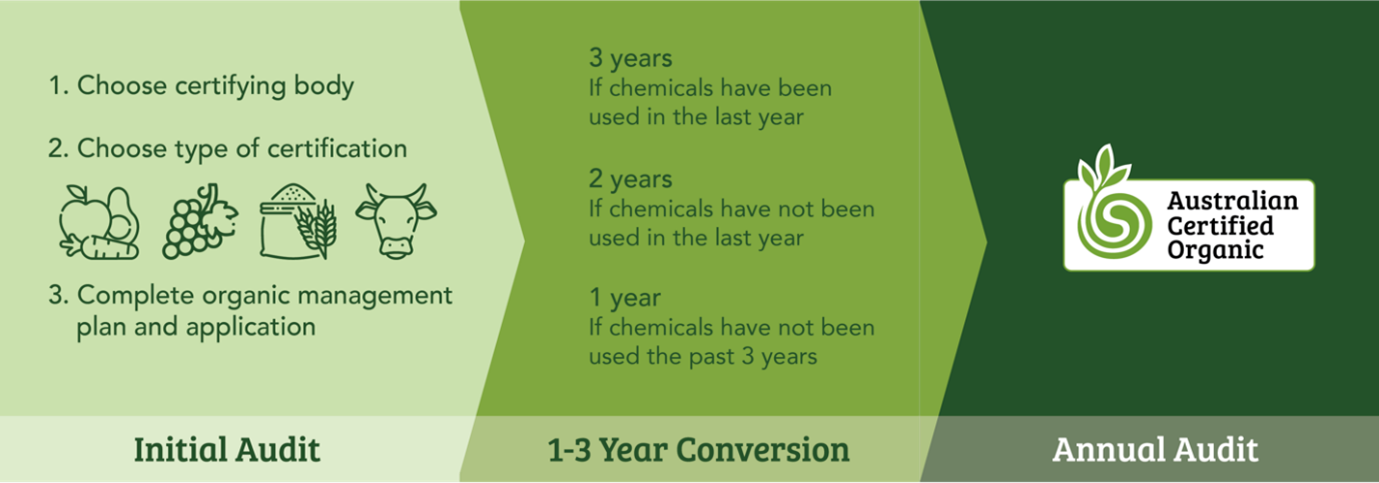Organic production is based on a system of farming that maintains and replenishes soil fertility without the use of toxic, persistent pesticides or synthetic fertilisers. It also includes welfare standards for animal husbandry and prohibits genetically modified organisms.
Once you have decided to convert to organic production, the next step is to choose an organic certification body. There are currently six certifying bodies approved by the Department of Agriculture, Fisheries and Forestry[1]. There are several differences between each certification body, including but not limited to: price, service level (responsiveness, helpfulness on phone), international market access, access to the Australian Certified Organic Bud logo, and proximity to you.
All Australian organic produce for export must be certified to the National Standard for Organic and Biodynamic Produce (NS). However, for more in-depth information on organic regulations, you can also certify solely to the Australian Certified Organic Standard (ACOS).

From the start of your certification application, it can take between 1-3 years to become certified organic for producers, dependent on previous farm chemical usage and history. However, for processors, the certification status typically takes less than 3 months from document lodging.
Given the diversity of organic agriculture, there are different documents you must complete for different sectors. The application for organic viticulture will be different to organic livestock, for example.
The most important part of your application is your Organic Management Plan (OMP). In some cases, this is alternately referred to as an Organic System Plan, Organic Handling Plan, or Organic Farm Plan. The OMP details how you will proactively manage your operation to ensure it remains compliant to the standards. The OMP must be sufficiently detailed to allow a certification officer (sitting in an office) to understand the finer points of your operation and how you plan to ensure ongoing compliance to the organic Standards.
Depending on which standard you are certified to, there will be slightly different organic inputs allowed. If you are unsure whether a product is allowed or not, direct confirmation with your certifying body is always the best option to ensure they are allowed under organic certification.

Once the OMP is approved by the certification body, the role of the inspector (auditor) is to visit the site and ensure the approved plan matches reality. If this is not the case, you will be issued with Corrective Action Requests (CARs) that need to be rectified. A standard audit can take anywhere from several hours to a couple of days on site, all depending on scale and complexity of the operation.
Certification can take a producer 1-3 years depending on past chemical usage and history. However, for processors, this typically takes less than 3 months from document lodging.
Once you have completed the conversion period, you are officially certified organic and must complete perpetual annual audits and soil testing to ensure you remain adherent to the organic standards. Remember to keep a record of farm inputs, activities and outputs to facilitate the audit process. If you are an organic producer, you do not have to do what an auditor says; you should instead document the recommendations and speak to your certification body.
Become a member of Australian Organic Limited to support your transition to organic practices. By becoming a member, you will join a large community of certified organic operators and like-minded individuals, opening new opportunities to learn, engage and promote your business.
Australian Organic membership provides you with resources to stay educated with the latest industry news and updates relevant to your sectors. You will receive a copy of the Australian Organic Market Report, a detailed market analysis which provides in-depth data about the organic market and consumer trends. You will also have the opportunity to promote your organic business through different events, field trips and campaigns throughout the year.
Find out more on the AOL website here.
Australian Organic Limited (AOL) is the peak body for the organic industry.
AOL acknowledges the Traditional Custodians of the land on which we operate, the Turrbal and Yuggera people. We extend our respect to Elders past, present and emerging.